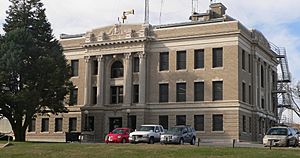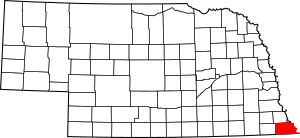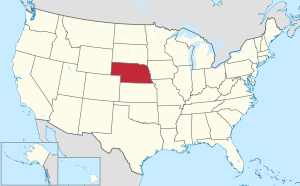Richardson County, Nebraska facts for kids
Quick facts for kids
Richardson County
|
|
|---|---|

Richardson County Courthouse in Falls City
|
|

Location within the U.S. state of Nebraska
|
|
 Nebraska's location within the U.S. |
|
| Country | |
| State | |
| Founded | 1854 (founded) 1855 (re-authorized) |
| Named for | William Alexander Richardson |
| Seat | Falls City |
| Largest city | Falls City |
| Area | |
| • Total | 555 sq mi (1,440 km2) |
| • Land | 552 sq mi (1,430 km2) |
| • Water | 2.7 sq mi (7 km2) 0.5%% |
| Population
(2020)
|
|
| • Total | 7,871 |
| • Density | 14.182/sq mi (5.476/km2) |
| Time zone | UTC−6 (Central) |
| • Summer (DST) | UTC−5 (CDT) |
| Congressional district | 1st |
Richardson County is the easternmost county in the state of Nebraska. It is located in the United States. In 2020, about 7,871 people lived here. The main town and county seat is Falls City.
If you look at Nebraska license plates, Richardson County has the number 19. This means it had the nineteenth-largest number of registered vehicles when the system started in 1922.
Some parts of the Ioway Reservation and the Sac and Fox Reservation are in the southeast corner of the county. These areas are between Falls City, Rulo, and Hiawatha, Kansas. The small village of Preston, Nebraska is located inside the Sac and Fox Reservation.
Contents
History of Richardson County
The area that is now Nebraska was opened for settlement on May 30, 1854. This happened because of a law called the Kansas–Nebraska Act. Richardson County was created in the same year. It was officially set up again in 1855 by the first group of lawmakers for the Nebraska Territory.
The county was named after William A. Richardson. He was a U.S. Representative from Illinois. He helped create the Kansas-Nebraska Act. Later, in 1858, he became the governor of the Nebraska Territory.
The first building used as a courthouse was built in 1863. A second courthouse was built in 1873. Sadly, it burned down on May 7, 1919.
On May 30, 1879, a very strong tornado passed through Richardson County. This tornado was called the "Irving, Kansas Tornado." It was an F4 tornado on the Fujita scale, which measures how strong tornadoes are. The tornado's path was about 800 yards (730 meters) wide and 100 miles (160 kilometers) long. This storm caused the deaths of eighteen people and injured sixty others.
In the summer of 1966, a plane crash happened near Falls City. It was Braniff Airlines Flight 250. The plane crashed because of bad weather. All 42 people on board died. The aircraft was flying from Kansas City to Omaha. This happened on Saturday night, August 6, 1966.
Geography of Richardson County
Richardson County is located at the very southeast tip of Nebraska. Its eastern border is next to the state of Missouri, across the Missouri River. Its southern border is next to the state of Kansas.
Many small rivers and streams flow through the county. These are branches of the Big Nemaha River. They flow southeast and empty into the Missouri River at the county's southeast corner. The land in the county has rolling hills. It slopes down towards the southeast. Most of the county's land is used for farming. The Missouri River in Richardson County is the lowest point in the entire state of Nebraska. This is where the river leaves Nebraska and goes into Kansas and Missouri.
The county covers a total area of 555 square miles (1,437 square kilometers). About 552 square miles (1,429 square kilometers) is land. Only 2.7 square miles (7.0 square kilometers), or 0.5%, is water.
Main Roads
Several important roads go through Richardson County. These include U.S. Highway 73 (![]() ) and U.S. Highway 75 (
) and U.S. Highway 75 (![]() ), which run north and south. U.S. Highway 159 (
), which run north and south. U.S. Highway 159 (![]() ) goes east towards the Rulo Bridge, connecting to Missouri. Nebraska Highway 8 (
) goes east towards the Rulo Bridge, connecting to Missouri. Nebraska Highway 8 (![]() ) runs west along Nebraska's southern border. Other state highways connect smaller towns in the area.
) runs west along Nebraska's southern border. Other state highways connect smaller towns in the area.
 U.S. Highway 73
U.S. Highway 73 U.S. Highway 75
U.S. Highway 75 U.S. Highway 159
U.S. Highway 159 Nebraska Highway 8
Nebraska Highway 8 Nebraska Highway 62
Nebraska Highway 62 Nebraska Highway 67
Nebraska Highway 67 Nebraska Highway 105
Nebraska Highway 105
Protected Natural Areas
Richardson County has several protected areas where nature is preserved. These places are great for outdoor activities like hiking, fishing, and enjoying wildlife.
- Four Mile Creek State Wildlife Management Area
- Indian Cave State Park (part of it)
- Kirkmans Cove Recreation Area
- Verdon Lake State Recreation Area
Neighboring Counties
Richardson County shares its borders with several other counties:
- Nemaha County - to the north
- Holt County, Missouri - to the east
- Doniphan County, Kansas - to the southeast
- Brown County, Kansas - to the south
- Nemaha County, Kansas - to the southwest
- Pawnee County - to the west
People of Richardson County
| Historical population | |||
|---|---|---|---|
| Census | Pop. | %± | |
| 1860 | 2,835 | — | |
| 1870 | 9,780 | 245.0% | |
| 1880 | 15,031 | 53.7% | |
| 1890 | 17,574 | 16.9% | |
| 1900 | 19,614 | 11.6% | |
| 1910 | 17,448 | −11.0% | |
| 1920 | 18,968 | 8.7% | |
| 1930 | 19,826 | 4.5% | |
| 1940 | 19,178 | −3.3% | |
| 1950 | 16,886 | −12.0% | |
| 1960 | 13,903 | −17.7% | |
| 1970 | 12,277 | −11.7% | |
| 1980 | 11,315 | −7.8% | |
| 1990 | 9,937 | −12.2% | |
| 2000 | 9,531 | −4.1% | |
| 2010 | 8,363 | −12.3% | |
| 2020 | 7,871 | −5.9% | |
| US Decennial Census 1790-1960 1900-1990 1990-2000 2010 |
|||
In 2000, there were 9,531 people living in Richardson County. There were 3,993 households, which are groups of people living together. About 2,567 of these were families. The population density was about 17 people per square mile (6.6 people per square kilometer).
Most people in the county were White (95.65%). There were also Native American (2.32%), Black or African American (0.19%), and Asian (0.15%) people. Some people were of two or more races (1.48%). About 1.05% of the population was Hispanic or Latino.
About 29.50% of households had children under 18 living with them. Most households (53.40%) were married couples. About 32.20% of all households were individuals living alone. Many people aged 65 or older (17.70%) lived by themselves.
The average age of people in the county was 41 years old. About 25.50% of the population was under 18. About 21.50% were 65 years or older. For every 100 females, there were about 93.50 males.
The median income for a household in the county was $29,884 per year. For families, the median income was $39,779. The average income per person in the county was $16,460. About 10.10% of the population lived below the poverty line. This included 10.50% of children under 18 and 11.50% of people aged 65 or older.
Communities in Richardson County
Richardson County has several towns and villages where people live.
Cities
- Falls City (This is the main town and the county seat)
- Humboldt
Villages
Unincorporated Communities
These are smaller communities that are not officially organized as cities or villages.
Former Communities
These are places that used to be communities but are no longer active or recognized as such.
- Archer
- Arago
- Mount Roy
- Winnebago
- Yankton
See also
 In Spanish: Condado de Richardson para niños
In Spanish: Condado de Richardson para niños
 | Jewel Prestage |
 | Ella Baker |
 | Fannie Lou Hamer |

